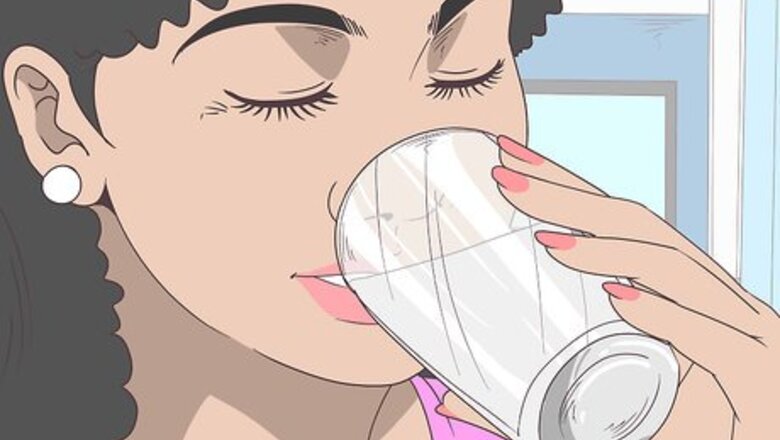
views
X
Trustworthy Source
MedlinePlus
Collection of medical information sourced from the US National Library of Medicine
Go to source
If you're interested in reducing them, you can try natural treatments like altering your diet and exercise routine. You can also try creams and supplements you can buy at drugstores or online. If at home treatments don't work, talk to a dermatologist and see if medical treatments would work for you. For vein problems in other areas look into options for repairing damaged veins.
Treating Spider Veins Naturally
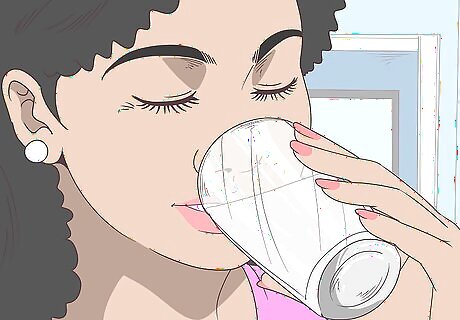
Stay hydrated. While the precise effects are unclear, many people swear by water's positive impact on skin. As drinking plenty of water is already good for your health, it can't hurt to up your water intake to improve the health of your skin. Try to drink between 2 to 3 liters (0.53 to 0.79 US gal) of water each day to stay hydrated.
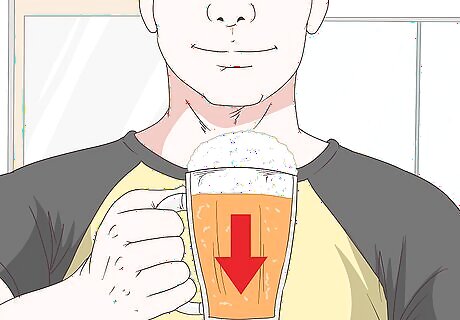
Drink less alcohol. In some cases, spider veins may be caused by excessive consumption of alcohol. If you're a regular drinker, try cutting back or eliminating alcohol from your diet and see if it makes a difference. This may lead to a reduction in spider veins around the nose.
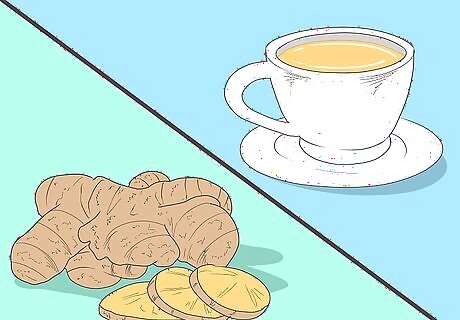
Eat more ginger. The evidence on diet's effect on spider veins is limited, but ginger's positive impact is supported by some anecdotal evidence. Foods rich in ginger, especially foods spiced with ginger, have reduced symptoms for some. Try adding ginger to tea and using raw ginger as a spice while cooking.
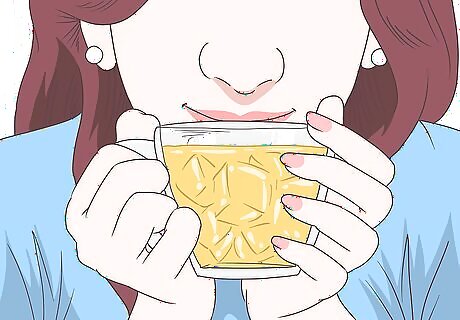
Drink cold green tea. Patients with similar skin conditions, like rosacea, sometimes benefit from drinking green tea. While evidence is minimal, there is some evidence green tea rejuvenates skin. Try having a cup or 2 of cold green tea a day and see if you get results. If you have an allergy to green tea, this method will not work for you. Hot beverages may inflame the veins, so avoid them.
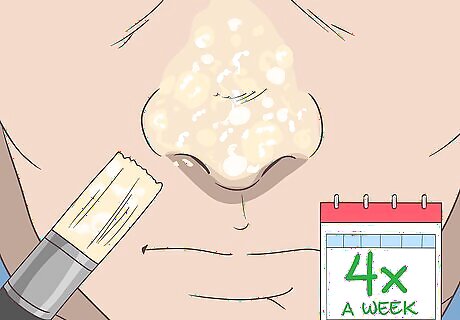
Apply an oatmeal mask. Oatmeal masks sometimes help patients with facial redness due to conditions like eczema and rosacea. Some people with veins around their nose find them helpful here as well, although the method has not be scientifically tested. Mix oatmeal and water into a paste and apply it to your nose. Wipe it off when it dries. Repeat this 4 times a week to see if there's a reduction in symptoms.
Trying Creams and Supplements
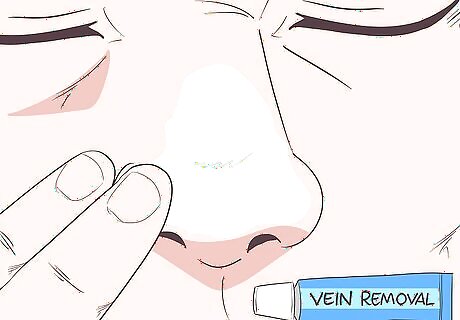
Try commercial creams. You can buy many creams for spider veins at drugstores, health stores, beauty salons, or online. These creams do not work for everyone, but they're a good place to start if you want to try avoiding medical treatments. Pick up a basic vein removal cream and apply it to your nose according to directions. It may help with symptoms. Keep in mind, some people may have reactions to creams. Read the instructions of any cream you purchase and apply it as directed. If you have a negative reaction, stop using the cream.

Use vitamin-based creams. Vitamins A, E, C, and K may help with skin health and reduce the appearance of spider veins. Most drug stores should sell creams containing these vitamins. You can also purchase creams online. Follow the directions on your bottle and see if the creams reduce symptoms.
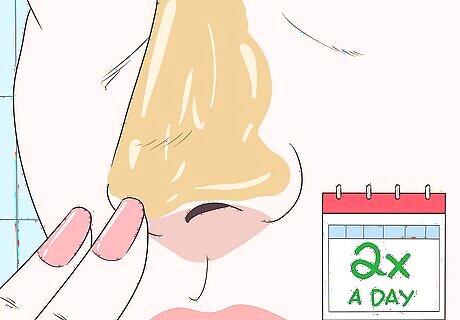
Try cypress oil. Some people find essential oils reduce spider veins, although more research is needed. Cypress oil in particular helps as it can increase circulation. Mix about 10 to 12 drops of your cypress oil with an ounce of a carrier oil such as olive oil. Rub it on your nose twice a day for several weeks. You may see results. Some people have bad reactions to essential oils. If you get a rash, skin irritation, or other negative reactions, cease using your oil immediately. Never use essential oils without diluting them first.
Seeking Medical Help
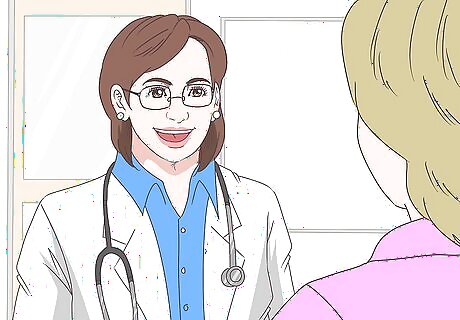
See a dermatologist to determine the cause of your spider veins. Spider veins can be caused by a variety of conditions, ranging from simple genetics to skin conditions like rosacea. Treatment depends on the cause of your spider veins, so see a dermatologist to determine the cause. They can recommend treatments from there. For example, if you're diagnosed with a skin condition such as rosacea, your dermatologist can recommend creams and cleansers to help treat the issue. Prescription topical treatments, such as Mirvaso (brimonidine) or Rhofade (oxymetazoline hydrochloride) may be an option.
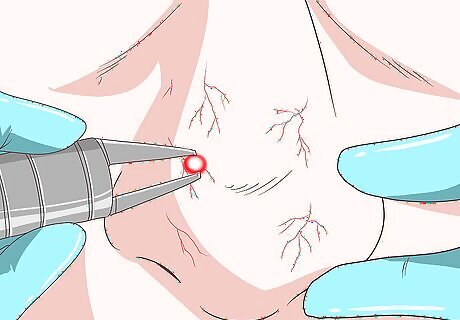
Get laser treatment. Laser treatment is one of the most common treatments for spider veins around the nose. Laser treatment involves targeting spider veins topically with lasers in a doctor's office. Laser treatments works well for some people, but others find it is ineffective or causes issues like scaring. Talk over the possibility of laser treatment with a doctor or dermatologist to help determine whether it would be effective for you.
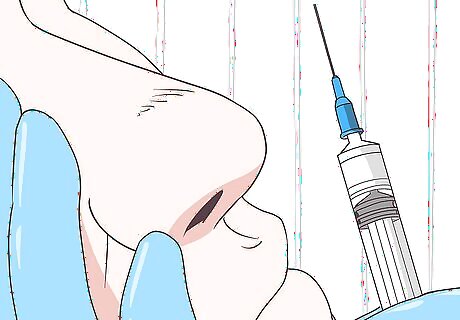
Try sclerotherapy. When getting sclerotherapy, a dermatologist will inject chemicals into the veins to produce a blood clot. When the clot is reabsorbed by your body the vein will disappear. This procedure is generally reserved for patients with many spider veins.
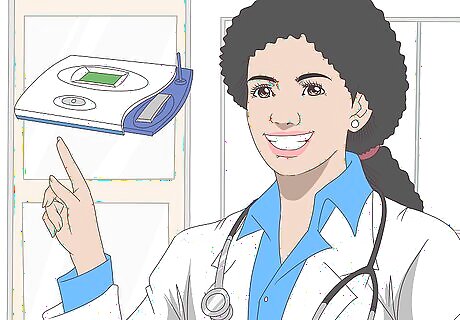
Ask a dermatologist about Veinwave. Veinwave is a treatment for spider veins that uses microwaves instead of light to target spider veins. It does come with a slightly reduced risk of side effects in comparison to laser treatment, but it's a new treatment and its long-term effects are unclear. If you're interested in Veinwave, talk to a doctor or dermatologist to determine if it's the best option for you. As Veinwave is a new and still relatively untested option, it's best to use this as a last resort if other methods don't work.
Preventing Spider Veins
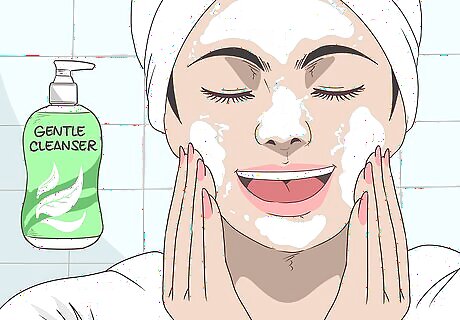
Use gentle cleansers on your face. Harsh cleansers and exfoliants damage the skin rather than help them. Choose a gentle daily cleanser for your face and avoid using exfoliating products with rough edges, such as crushed apricot shells. Apply a noncomedogenic moisturizer to your face each day. Avoid picking or squeezing pimples or pores, which can lead to spider veins.
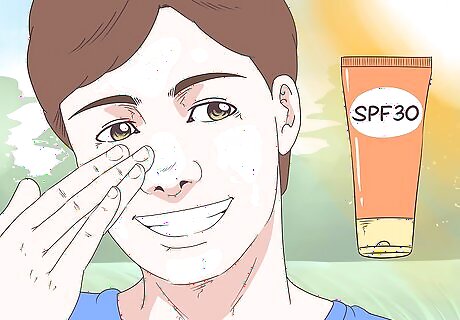
Protect your skin from environmental damage. Apply sunscreen with an SPF of 30 or higher each day to protect your skin from sun damage. Avoid going out in the sun during peak hours, and wear long-sleeved clothing and a wide-brimmed hat if you must. Wear a hat and scarf to protect your skin from extreme temperatures and wind burn in the colder months, as well.
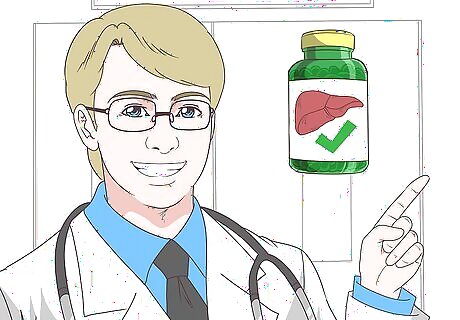
Support your liver. A poorly-functioning liver can lead to spider veins. Reduce your alcohol consumption and try taking supplements to support liver health. Such supplements include milk thistle, holy basil, dandelion root, and bupleurum. Consult your doctor before beginning any supplement regimen.
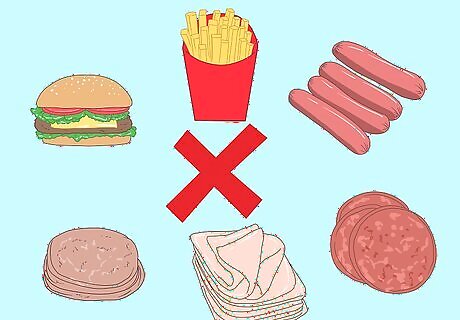
Avoid foods linked to inflammation. This is especially important if you have an autoimmune disorder. Foods to avoid include processed foods (like lunch meat and hot dogs), fast food, sugar, wheat and gluten.
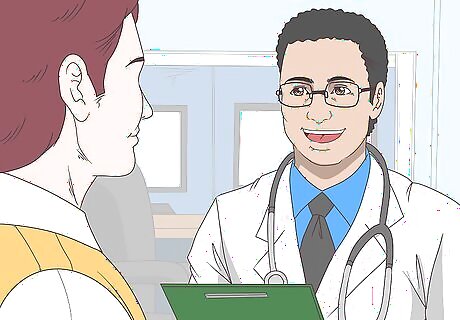
Discuss your medication options with your doctor. If you are on steroids or hormone replacements, an unfortunate side effect may be spider veins. Talk to your doctor about alternative medications you could take. It’s important that you don’t stop taking a prescribed medication, like steroids, before discussing the decision with your doctor.




















Comments
0 comment